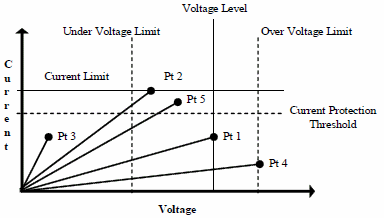IviACPwrBase Capability Group
The IviDCPwrBase capability group supports the most basic DC power supply capabilities. You can specify the voltage level, current limit, frequency, and control the operation of the output relay/contactor.
This document uses the following terms to describe the output of the power source: voltage level, frequency, phase angle, waveform, current limit, DC voltage level and impedance. Refer to the IviACPwr Terminology topic for more information on these terms.
User-Specified Settings
Current limit—Sets the maximum allowable current the AC power source will deliver. Configure the current limit with the Current Limit property.
Frequency—The frequency of the output AC voltage waveform of the AC power source. Configure the frequency with the Frequency property.
Frequency range—Specifies the output frequency range. AC power sources may support multiple frequency ranges. Configure the frequency range with the Frequency Range property.
Output enabled—Enables/Disables the output contactor/relay of the AC power source. Configure the output enable with the Output Enabled property.
Voltage level—The RMS AC output voltage of the AC power source. Configure the voltage level with the Voltage Level property.
Voltage Range—Specifies the output voltage range. AC power sources may support multiple voltage ranges to allow greater output voltage or current. Configure the voltage range with the Voltage Range property.
Waveform—The waveform the power source uses to generate the output voltage. Configure the waveform with the Waveform property.
User-Queriable Settings
Frequency range capabilities—Returns the minimum and maximum frequency supported by a particular frequency range.
Number of frequency ranges—Returns the number of supported frequency ranges.
Number of phases—Returns the number of physical output phases.
Number of voltage ranges—Returns the number of supported voltage ranges.
Voltage range capabilities—Returns the minimum and maximum voltages supported by a particular voltage range.
Power Source Voltage and Current Scenarios
The signal that the power source produces depends on the values of the voltage level and current limit that you supply, and the impedance of the load to which the power source is attached. Therefore, the power source might not produce the exact voltage or current that you configure. The following figure shows the possible output scenarios.

At Point 1, the AC power source output has reached the voltage level before it reached the current limit. This is an example of the AC power source operating in the constant voltage mode. The voltage level is defined by the Voltage Level property.
At Point 2, the AC power source output has reached the current limit before it reached the voltage level. This is an example of the AC power source operating in the constant current mode. The current limit is defined by the Current Limit property.
At Point 3, the AC power source output is below the under voltage protection limit. If under voltage protection is enabled, the power source disables the output. This mode is controlled by the IviACPwrVoltageProtection Extension Group.
At Point 4, the AC power source output exceeds the over voltage protection limit. If over voltage protection is enabled, the power source disables the output. This mode is controlled by the IviACPwrVoltageProtection Extension Group.
At Point 5, the AC power source output exceeds the current protection threshold. If current protection is enabled and the AC power source output current has reached or exceeds the current protection threshold for the time specified by the current protection delay, the AC power source disables the output. This mode is controlled by the IviACPwrCurrentProtection Extension Group.
IviACPwrBase VIs
IviACPwr Configure Current Limit
IviACPwr Configure Output Enabled
IviACPwr Configure Voltage Level
IviACPwr Configure Voltage Range
IviACPwr Configure Frequency Range
IviACPwr Query Voltage Capabilities
IviACPwr Query Frequency Range Capabilities
IviACPwr Get Output Phase Name
IviACPwrBase Properties
IviACPwr Number of Voltage Ranges
IviACPwr Number of Frequency Ranges